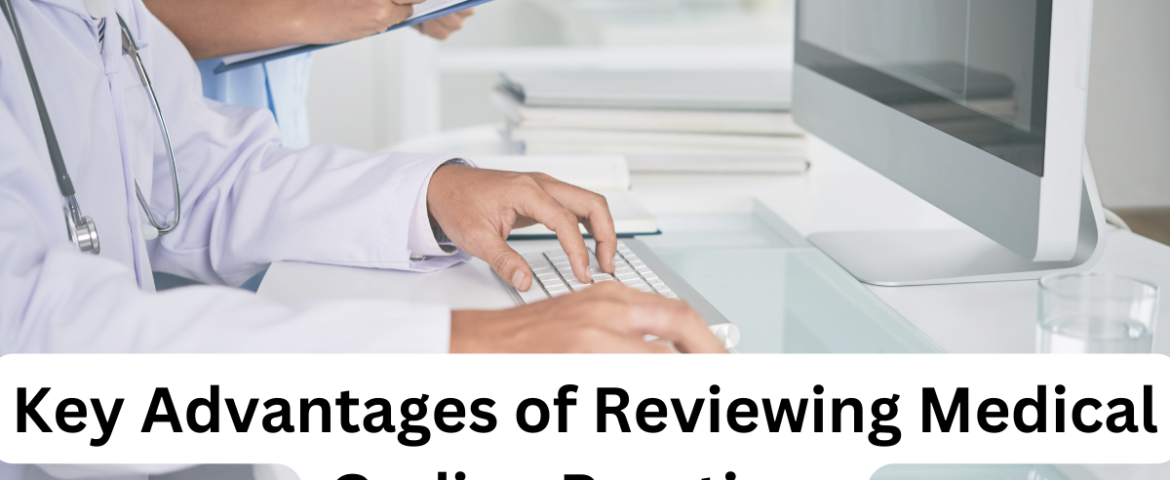Introduction
Medical coding is a critical aspect of healthcare operations, translating complex medical procedures and services into universal codes for accurate billing and documentation. In this intricate process, errors can occur, leading to financial losses, legal complications, and compromised patient care. Regularly reviewing medical coding practices through audits is paramount for healthcare practices to ensure compliance, maximize revenue potential, and elevate overall quality standards.
Ensuring Compliance: Why It Matters
Compliance in coding is not just a regulatory requirement; it is a fundamental aspect that ensures accuracy, transparency, and adherence to coding guidelines. Failure to comply can result in financial penalties, legal consequences, and a detrimental impact on patient care. Reviewing practices through audits serves as a proactive measure to achieve and maintain compliance assurance. By aligning with the latest regulatory standards set by governing bodies such as CMS and AMA, healthcare practices foster transparency, accuracy, and trust among patients and stakeholders.
Maximizing Revenue Potential through Reviewing Medical Coding Practices
Revenue optimization is a primary concern for healthcare organizations, and coding audits play a pivotal role in achieving this goal. Through a meticulous examination of coding practices, audits identify discrepancies, errors, and missed opportunities in coding and billing processes. By rectifying inaccuracies and ensuring compliance, healthcare practices can optimize revenue streams. This leads to fewer claim denials, reduced instances of undercoding or overcoding, and enhanced reimbursement rates, contributing to the financial health of the organization.
Error Identification and Correction: Enhancing Accuracy
Inaccuracies can lead to billing discrepancies, improper reimbursement, and potential legal implications. The key advantage of reviewing practices is the identification and correction of errors. Audits scrutinize coding practices to reveal inaccuracies, discrepancies, and potential coding errors. Early identification allows healthcare providers to rectify coding discrepancies promptly, ensuring the accurate representation of medical services provided. This process enhances the overall quality of healthcare data and minimizes the risk of financial penalties resulting from coding inaccuracies.
Mitigating Risks: The Importance of Reviewing Medical Coding Practices
Mitigating risks within the coding and billing processes is crucial for maintaining the integrity of healthcare data, ensuring accurate billing, and safeguarding patient care. Inaccuracies in medical coding can lead to financial losses, legal complications, and compromised patient outcomes. Regular reviews of medical coding practices help healthcare providers avoid compliance issues, billing inaccuracies, and potential legal ramifications. Medical coding audits improve financial stability and regulatory compliance by proactively managing risks.
Read More – https://i-conicsolutions.com/common-medical-coding-mistakes/
Elevating Quality Standards: Improving Documentation Accuracy
Accurate medical documentation is vital for efficient patient care, billing, and legal purposes. Reviewing medical coding practices through audits ensures accurate documentation through proper assessment. An audit entails a methodical examination of medical records and coding procedures in order to spot inconsistencies, mistakes, or potential improvement areas. Feedback from these audits allows healthcare providers to address deficiencies, implement corrective measures, and enhance documentation practices. This iterative process improves the accuracy of medical records and contributes to the overall efficiency and effectiveness of healthcare services.
Elevating Quality Standards: Improving Documentation Accuracy
Accurate and timely billing is essential for maintaining compliance with regulatory requirements, reducing claim denials, and minimizing billing errors. Reviewing medical coding practices contributes to streamlined billing processes by identifying and correcting coding inaccuracies. Audits help improve documentation accuracy and ensure proper code assignment. Medical coding audits support ongoing process development by offering insightful information about coding correctness, which ultimately maximizes revenue cycles and supports the overall financial stability of healthcare organizations.
Conclusion: Harnessing the Benefits of Reviewing Medical Coding Practices
The key advantages of regularly reviewing practices are undeniable. Ensuring compliance, maximizing revenue potential, enhancing accuracy through error identification and correction, mitigating risks, elevating quality standards, and streamlining billing processes are crucial for the overall success and sustainability of healthcare organizations. By actively incorporating medical coding audits into their processes, healthcare practices can navigate the complexities of coding, minimize risks, and ultimately contribute to improved patient care and a more efficient healthcare system.
Learn More – https://i-conicsolutions.com/service/medical-coding-services/






